Four Poems from An ABC Bestiary of Central America
written and translated by Jeremy Padenillustrated by Annelisa Hermosilla
A—Ajolote
Monstruo de las aguas.
Renacuajo perenne.
Vuelas por las chinampas
con tus branquias plumadas.
Llegas desde los tiempos remotos
cargado de secretos ambiguos.
Ay, si pudieras con tu magia
regenerar las aguas de los lagos
y purificar nuestro corazón
contaminado.
A—Axolotl
Water monster.
Eternal tadpole.
You fly through chinampas
with your feathery gills.
You arrive from the distant past
full of uncertain secrets.
If only you could with your magic
regenerate the waters of these lakes
and cleanse our contaminated
hearts.
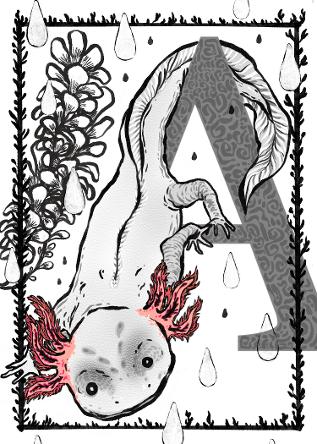
O—Oropéndola
Oropéndola, oropéndola,
las plumas doradas de tu cola
son la ocasión de tu nombre
y no el péndulo
de tu nido
que mece tus huevos
y tus pichoncitos
al pasar el viento
y que te protege
del mono y del tayra.
No eres como la reinita cerúlea
que vive en los Andes
pero anida y cría
en los Apalaches,
pajarito diminuto
que con cada migración
encuentra menos montañas
y menos bosque.
Tú, oropéndola,
no tienes que migrar.
Desde tu posadero
ves reposar el perico ligero
teñido verde de musgo,
lo ves dormirse
todo el día y te ríes,
te ríes y bailas
en tu ramita
para atraer una pareja.
O—Oropendola
Oropendola, oropendola,
your golden tail feathers
give you your name
and not the pendulum
of your nest
that rocks your eggs
and chicks
as the wind blows,
that keeps you safe
from monkeys and tayra.
You are unlike the cerulean warbler
that lives in the Andes
but nests and fledges
in Appalachia,
that tiny bird
who with every migration
finds fewer mountains
and fewer forests.
You, oropendola,
are free to live in one place.
From your perch
you watch the moss-stained sloth
sleep away its days,
and you sing
your laughing song
as you dance
on your branch for a mate.
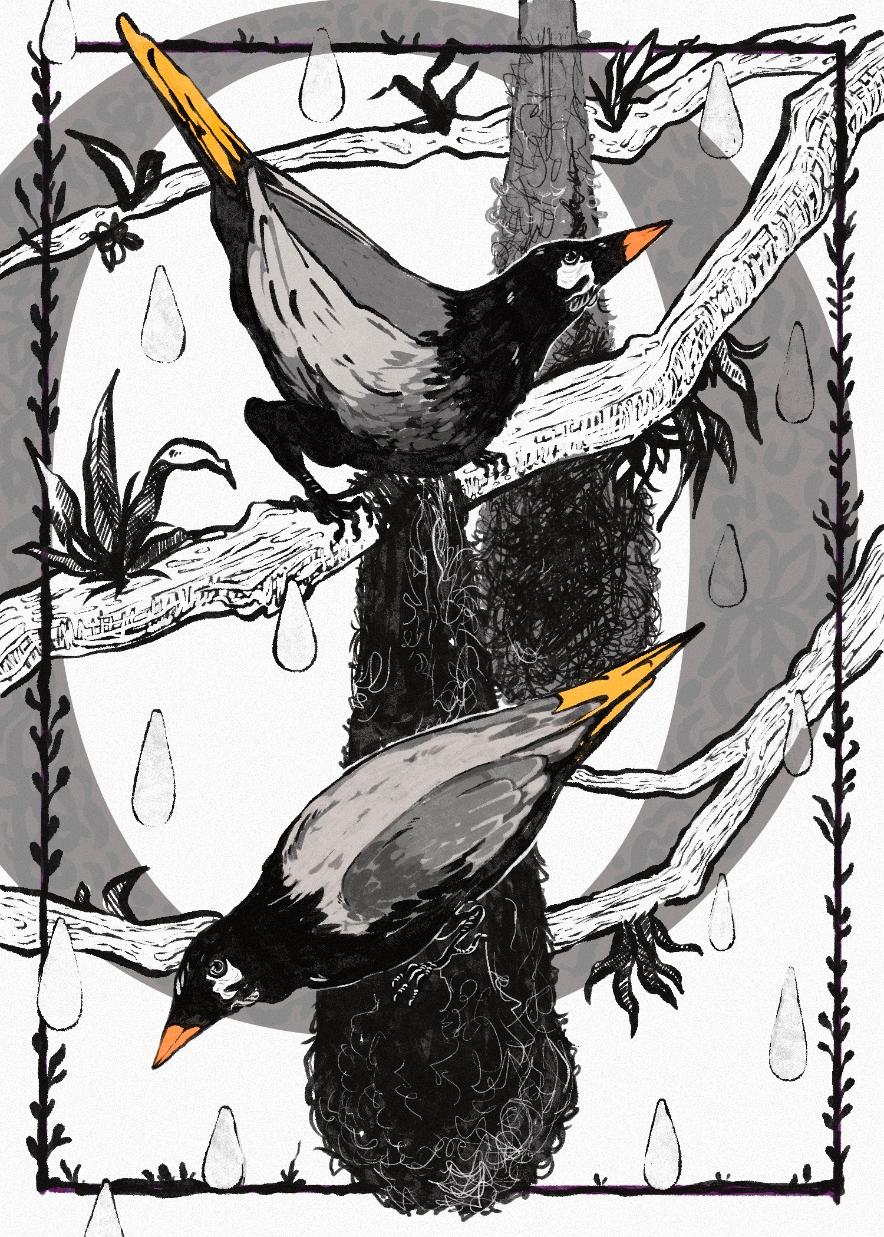
U—Ursón
O, puercoespín americano,
roedor que algunos llaman ursón
porque el comte francés Buffón,
quien nunca visitó tus tierras
así te bautizó por tus erizos.
O, puercoespín, o, puercoespín oso
sin ser oso, aunque te trepes en los árboles,
qué cosa, esta cuestión de nombres
y de origen, ursón no de oso, sino erizo.
O puercoespín, o, ursón cerdoso,
antes hubo quienes decían
que el navegador inglés Hudson
te quiso tanto que te bautizó
con su nombre.
O puercoespín, puerco espinoso,
los náhuatl te llamaban
huitztlacuatzin, espina preciosa.
O espina, espina preciosa,
dicen los científicos que subiste
desde Sudamérica por el istmo.
Dicen que en un continente de migrantes
eres tú contado entre los primeros.
U—Ursón
Oh, American porcupine,
rodent some call urson
because the French count Buffón,
who never set foot in your lands,
named you so because of your quills.
Oh, porcupine, oh, tiny prickly bear,
though not a bear you climb up trees,
names and their origins are so strange,
urson not from ursa but from urchin.
Oh, porcupine, oh, bristly urson,
there were those who used to say
the English navigator Hudson
loved you so much he baptized you
with his own name.
Oh, porcupine, spiny pig,
the Nahua called you
huitztlacuatzin, precious quill.
Oh, quill, precious quill,
scientists say you walked north
from South America over the isthmus.
In a continent full of migrants,
you are numbered among the first.
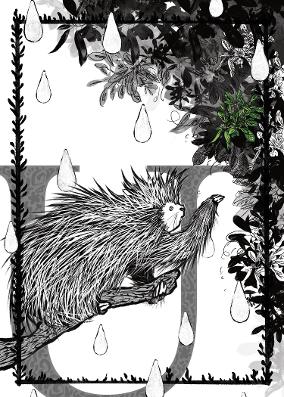
Y—Yacaré
La era mesozoica era tuya, yacaré,
era tuya caimán, cocodrilo.
Dominaban ustedes el mundo,
señores sin igual.
A diferencia de los dinosaurios,
supieron cómo adaptarse,
cómo limitarse a las cuencas
de los ríos y los estuarios.
Como todo monstruo son agentes
de destrucción y creación.
Como todo monstruo son
temidos y malentendidos.
Los mayas dicen que tu cuerpo
forma el tronco del árbol de la vida.
Dicen que tu espalda
es un mapamundi.
Y—Yacaré
You owned the Mesozoic era, yacare.
You owned it, caiman, crocodile.
You dominated all the world,
lords without equal.
Differently than the dinosaurs,
you knew how to adapt,
how to limit yourself to river
basins and estuaries.
Like every monster, you
destroy and you create.
Like every monster, you
are feared and misunderstood.
The Mayas say your body
forms the trunk of the Life Tree.
They say your back
is a map of the world.
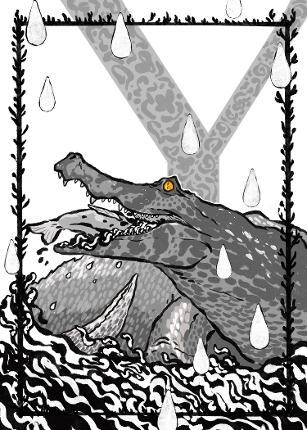
Jeremy Paden was born in Italy and raised in the American Southeast, Central America, and the Caribbean. He is professor of Latin American literature at Transylvania University and the author of several books of poems and translations. His most recent books are: Under the Ocelot Sun (Shadelandhouse Modern Press, 2020), a bilingual, illustrated children's book about the Central American migrant caravans, world as sacred burning heart (3: A Taos Press, 2021), and Self-Portrait as an Iguana (Valparaíso USA, 2021). The selections featured here are meant for a children's book tentatively titled An ABC Bestiary of Central America.
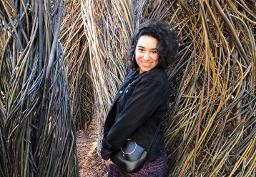
Annelisa Hermosilla (b. 1996) is a Panamanian artist based in Washington, DC. She graduated from Transylvania University (Lexington, KY) in 2018 with a major in Studio Art and a minor in Art History. She is a visual artist versed in traditional materials, with a passion for the human figure, flora, and spiritual themes. She has illustrated a number of books for Shadelandhouse Modern Press, among these No Distance Between Us (2021) by Marianne Peel and Under the Ocelot Sun (2020) by Jeremy Paden, which received the Campoy-Ada Award in March 2021 for illustrated books with special cultural content.
